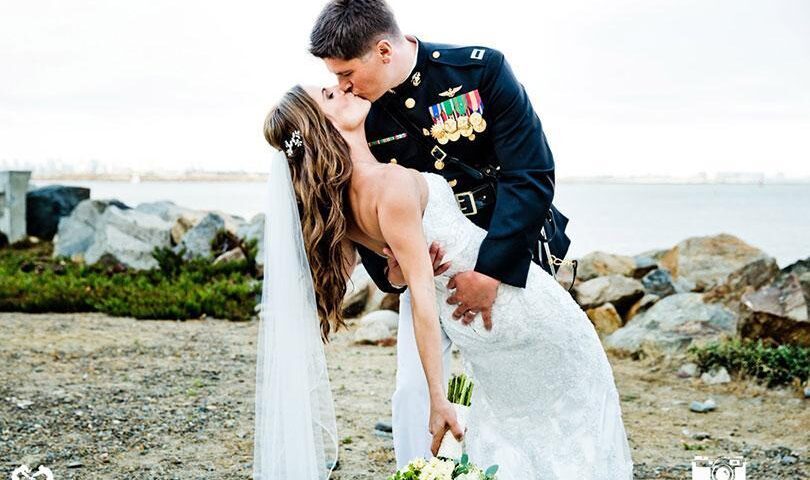
7 Things Your Kids Need to Hear You Say
November 18, 2024
Expensive Wedding Venues USA
November 18, 2024Military Marriages: Challenges and Realities
All marriages need work, but military marriages present even more challenges for couples. There are long periods of separation from family and partners; there’s not much money, at least for younger service members; and perhaps most crucially, continued and long-term fears about the safety of military personnel deployed in combat zones.
The military divorce rate is higher than the national average, although rates have been dropping. The divorce rate among both officer and enlisted men and women is around 3.1 percent and has steadily declined since 2011, when it reached a high of 3.7 percent.
Military Marriages vs Civilian Marriages
While military couples certainly face challenges civilians never will, long, successful marriages are fairly common too. Jacey Eckhart studied long-term married military couples and found some interesting statistics and facts about the differences between military couples and civilian ones. Eckhart’s study examined the most common type of military marriage where the husband was a service member and his wife was a civilian. Here’s what the study found:
Military Couples Marry Younger
The average age of military couples at the time of their first marriage in Eckhart’s study was 22 years old. That’s around four years younger than the national average. Eckhart suggests that it is possible that anyone who is ready to commit to the military may be the kind of person who is more ready to commit in general.
Younger weddings often mean military couples start building families earlier than civilians, which can create unique pressures on finances, parenting, and relocation. According to military marriage statistics, many army couples who marry young experience both higher stress levels and a strong sense of shared resilience. These early commitments show how different the dynamics of a military marriage can be compared to civilian ones.
Military Couples Move Frequently
This is unsurprising, and normal for military life, but it can put a strain on relationships. Military couples moved an average of 8.6 times in 20 years of marriage, which is more than twice the US average.
Frequent moves often lead to disruption in careers, the schooling for children, and the friendships that the couple usually have. Studies on divorce rates in the military show that relocation stress is one of the key factors affecting long-term satisfaction in a military marriage. However, many couples develop adaptability and resilience through constant change, proving that a military marriage can endure challenges that most civilian relationships never faced.
Job Satisfaction Shapes Home Life
Husbands in the military who thought of their service as a calling or vocation had happier home lives than those who saw it as a job.
This sense of purpose helps balance the difficulties of frequent deployments and separations of long term. In fact, surveys indicate that when servicemen view their duties as more than a paycheck, they often report lower military marriage divorce rate figures. A strong commitment to the mission tends to strengthen the emotional connection at home, showing the impact of professional satisfaction on the success of an army couple.
Understanding Is Crucial
Wives of military servicemen who had been married for twenty years or more told Eckhart that life in the military was worth it because of how much their husband “loved” his job or how he “didn’t want to be anything else.” Understanding a serviceman’s commitment to the military was a key characteristic of long-married couples.
For many spouses, grasping the realities of deployments in different countries, relocations, and the constant risk involved is essential. Those who fully accept what a military and marriage lifestyle entails are less likely to separate. Data on the military divorce rate after deployment shows that couples with higher levels of mutual understanding experience greater marital stability, even under the toughest circumstances of life.
Civilian Wives Are Responsible for Domestic Life
Since servicemen are either training for deployment, are deployed, or returning from deployment, they are frequently away from home. This means wives are responsible for keeping family life together, more so than with civilian couples. Although this may seem very much like a traditional division of gender roles, for military couples it was a pragmatic solution to the reality of their lives.
While this division of labor may look old-fashioned, many families highlight it as the only practical way to maintain order during long absences. Research on divorce rate USA compared with military and marriage data shows that balancing domestic responsibilities is a critical factor for long-term survival. Civilian spouses who manage these challenges effectively play an important role in keeping a military marriage stable.
Family Life Is Very Important to Long-Married Military Husbands
Long-married military husbands told Eckhart that family, and its routines, was very important to them and that it acted as a bedrock in their lives.
Helping with Housework Is Beneficial for Servicemen
While wives may be responsible for the daily running of the household, helping out around the house helped military husbands to get back into the routine of family life after deployment. A willingness to do so was a key factor in military couples staying married for the long haul. Driving children to school or activities and doing chores like laundry helped servicemen reconnect with their families and signaled to their wives their desire to be part of the family.
Learn more about body language in arguments and explore other resources on Catholic Marriage Classes Online.

